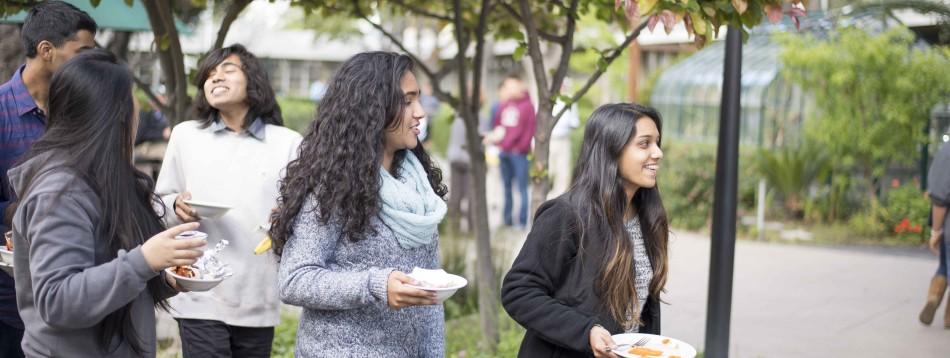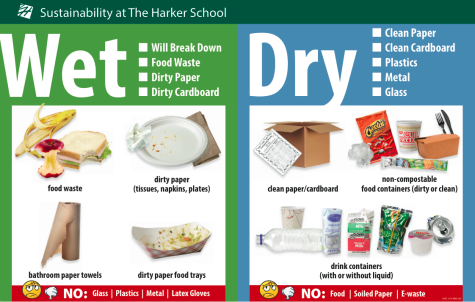Trash System Updated
New procedure starting after break separates wet and dry litter
April 4, 2014
System: Improved
The Upper School is working towards a cleaner campus, especially around the eating locations, by improving student habits through a grading system and spreading awareness.
ASB created a grading system that includes punishments and rewards in January due to the worsening of the clean-up after lunch. These include giving ice cream as a reward, and punishing students by removing the Mexican food bar, and the desserts section.
Since the beginning of the year, people have been seeing improvement.
“I think that all the students are doing great now,” said Gustavo Parra, who is in charge of assigning the daily lunch grades. “They pay attention more on these things. Even some of the students, [if] they see trash on the table, they go and pick it up even if isn’t theirs so they have improved a lot.”
Members of the Green Committee also support the grading system and hope that the system will remind students to clean up after themselves.
“There have been no repercussions for students who leave their messes,” said Diana Moss, a member of the faculty Green Committee. “I heartily approve of the students’ losing their Mexican food and desserts and hope that through peer pressure, everyone will think how their actions affect everyone else.”
Other students, like co-president of the Green Team, Sabrina Sidhu (11) agree, and believe that the best solution to this school-wide issue would be for students to simply clean up after themselves.
“Although we haven’t worked directly with student council to try and fix the current trash problem, we support what they’re doing,” she said.
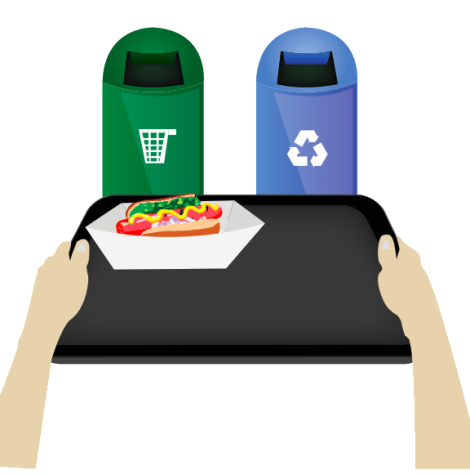
“I think the biggest thing students can do to help the current situation is just clean up after themselves and remind their friends to do the same. As simple as it sounds, it’s essential.”
Other students think that the system is working but disagree with the rewarding system.
“I think it’s working okay, but I think that even if we do well, we shouldn’t get ice cream or like awards because cleaning up for ourselves is something that we should know how to do already,” Annie Zhou (10) said.
Student council will be monitoring the system in the upcoming weeks to improve student habits.
New System
Members of the Green Committee will be implementing a new trash system on the Upper School campus on April 14, to make handling of trash easier and more eco-friendly.
Last year, the City of San Jose adopted a new system in which garbage is sorted into wet and dry piles, rather than sorting recycling and garbage into various sections.
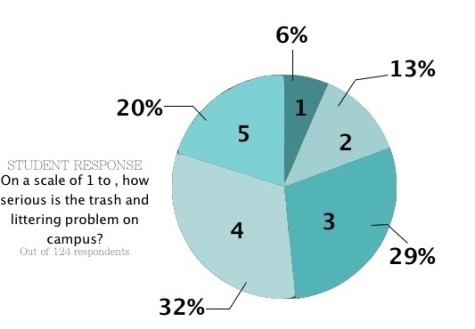
Jeff Sutton, co-head of the Green Committee, said that separating the trash into a dry section, and a wet section with compostable items, would make the trash collection process more efficient.
“To help [our trash collectors] out, we want to, on the campus, split our trash into two streams. One stream is called the dry stream. Anything not compostable like cups, plastic, or metal, would be in the dry stream. And in the wet stream, would be anything that is compostable,” he said.
The Green Committee believes that the new trash system will also help address the problem of trash left in eating areas.
“I think the concerns that students not disposing of their waste properly is inevitably going to get folded into [this],” Schafer said. “In a way, I think that it is going to kill two birds with one stone: there is a problem that already exists, and I’m hopeful that this will help address it.”
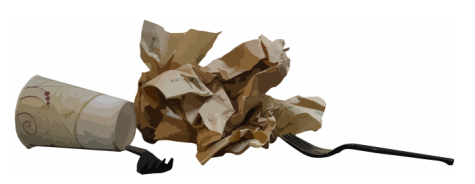
Members of the faculty are currently in the process of educating students about the new trash system, to create a smooth transition to the wet-dry bins.
APES Project
The AP Environmental Science (APES) class started a project two weeks ago to spread awareness of the waste students produce daily.
Environmental Science teachers Kate Schafer and Jeff Sutton assigned students to carry around a plastic bag for a week to collect self-generated trash items. Throughout this process, they recorded a tally of all their solid waste.
“Students collect all of their trash for a week to get a better idea of the types of waste and the amount that they generate. We hope to give students a better awareness of the waste that they are generating and to get them thinking about simple ways they might reduce waste,” said Environmental Science teacher Kate Schafer.
Schafer added that the amount of trash the students collected varied, but for the most part they averaged a full bag of trash.
“It lasts for a week and then they extrapolate the amount that they would generate in a year,” she said. “Each student generates about a bag’s worth, but there’s a lot of variation in the amount generated.”
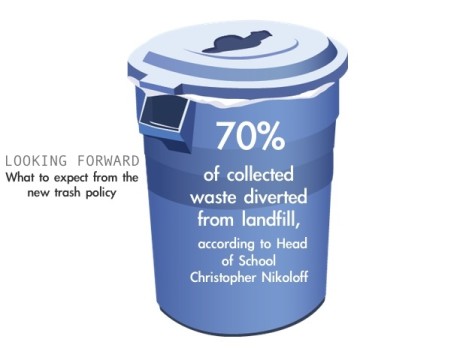
The project was successful in that the students’ takeaways were in sync with the intentions of the teachers.
“[I will] recycle more because a lot of the stuff that was we use is reusable,” APES student Vikram Naidu (12) said.
From the collected data, students were able to determine the percentage of plastic and cardboard in their waste.
Under Custody
The leftover sandwich, a bowl with marinara, a Caprisun pouch, eraser shavings on the classroom floor. Where do all these items end up after we go home each day?
The custodians are responsible for maintaining the sanitation and cleanliness of our campus.
The locations on campus are broken down into five sections: academic building, Nichols Hall, Dobbins and Manzanita, Shah Hall and the art complex, and bathrooms. A custodian is responsible for cleaning each section.
The current plan for the new trash project is to downsize the number of trash cans around campus. This has been implemented a couple times in the past, but has failed due to students throwing everything in the wrong bin.
“I think that if the Harker community as a whole gets involved, it would be successful,” J.R. Del Alto said.
The trash on campus is a “hit or miss,” according to Del Alto, as students sometimes leaves areas spotless, whereas other times they leave a mess.
“If everyone picks up after themselves, just a little bit, it’s going to make all the difference in the world,” he said.
This article was originally published in the pages of the Winged Post on April 4, 2014
